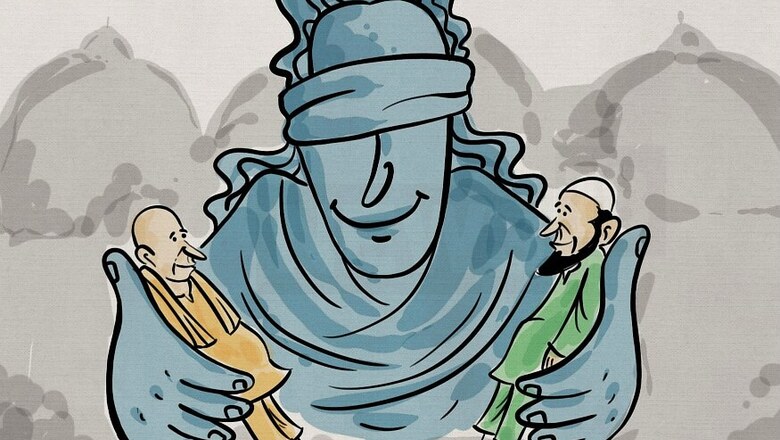
views
New Delhi: Ahead of the Supreme Court ruling on the decades-long Ramjanmabhoomi-Babri Masjid dispute, while security has been intensified in Ayodhya and other sensitive areas, appeals are being made by politicians, religious leaders and prominent citizens to maintain amity and harmony. However, some say, more than Muslims, it is the responsibility of the majority Hindu community to keep the peace.
Speaking exclusively to News18, renowned poet Munawwar Rana said the Hindus of the nation are the custodians of the Muslims of the country. “In the current prevailing situation in the state and in the country… as we all know that the Supreme Court’s verdict on the Ayodhya issue is expected shortly. All our ulemas (Muslim scholars), political leaders and dharm gurus (religious leaders) are telling the Muslims what to do and what not to do. But, as per my view, the biggest responsibility in this country lies with the majority,” he said.
“Almost 30 years ago when I went to Pakistan, which was our enemy country then and which is our enemy country today also, I remember telling them in an interview that I live on the watch of 80 crore Hindus and there can be no bigger safety cover than that. Today, the Hindus of this country have to prove that Muslims live on their watch. It is not the sole responsibility of Muslims,” he added.
Shia cleric Maulana Kalbe Jawad echoed these sentiments. “We all are waiting for the Supreme Court’s verdict and I would like to say that Muslims should accept the apex court’s verdict no matter in whose favour it comes. Even I would like to appeal to Hindu brothers also to accept whatever verdict comes from the Supreme Court. The religious leaders in Hindu society should also appeal to their community to maintain peace even if the order doesn’t come in their favour.”
At the centre of the Ayodhya row is a 16th-century mosque that was torn down by right-wing mobs in 1992, sparking riots that killed nearly 2,000 people. Many Hindu groups believe that the Babri Masjid was actually constructed on the ruins of a temple that was demolished by Muslim invaders. On September 30, 2010, the Allahabad High Court ruled that the disputed land be split into three parts: the site of the Ram Lalla idol would go to the party representing Ram Lalla Virajman (the installed infant Ram deity), Nirmohi Akhara to get Sita Rasoi and Ram Chabutara, and the Sunni Wakf Board to get the rest. All three parties then appealed against the decision in the Supreme Court. The verdict is expected to be pronounced before Chief Justice of India Ranjan Gogoi, who is heading the bench that was hearing the matter, retires on November 17.
All India Muslim Personal Law Board (AIMPLB) member and renowned Sunni cleric Khalid Rasheed Farangi Mahali too said that the judgement, in whatever form, must be respected by all. “The final verdict on Ayodhya is expected soon and we had called for a peace conference at Islamic Centre of India, Lucknow in which representatives from all religions participated. And the one message that was given was of peace and brotherhood,” he said. “All should welcome the decision of the Supreme Court and should not say or do anything that hurts anyone’s sentiments.”

















Comments
0 comment